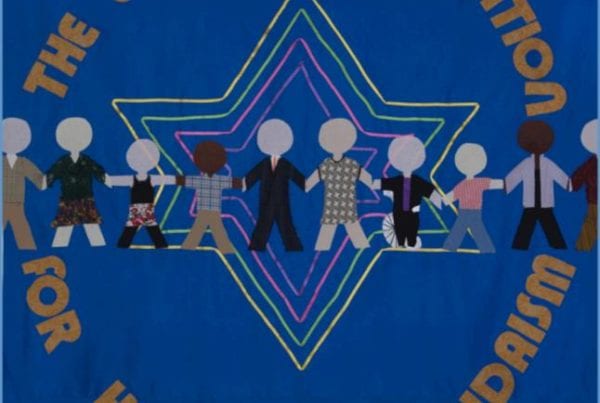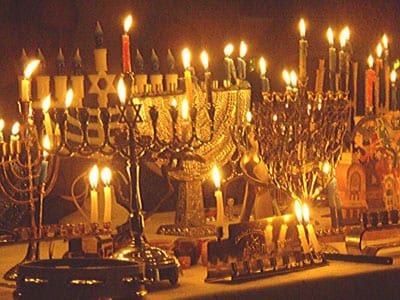Forgiveness
Laura Finfer
Families are complicated. Mine is especially so. My mom passed away in May; she had borderline personality disorder. It is a condition that made her moods unstable, her actions chaotic, and her memory paranoid and distorted. Yet outside our home, she functioned quite well, especially when we were young.
My mom was intelligent and interested in education. She pursued multiple Masters degrees and as a kid, I recall that she constantly took all sorts of classes – from wine tasting to literature to racquetball lessons. She read extensively; I cannot recall a time when my mom was not absorbed in a novel. And I’m pretty certain she never missed a single NY Times Best Seller. As an elementary school teacher in the NJ town where I grew up, she seemed to be admired. She emanated energy, passion, and creativity. She was called upon to train and mentor younger teachers. She actively participated in the teachers union, the PTA, and our synagogue, often holding multiple leadership positions simultaneously.
My mom also enjoyed culture. She exposed my brother and me to museums, Broadway shows (always with the original casts), ballet, opera, and the Philharmonic. When special exhibits came to NYC museums, she made sure to get tickets. She loved all that New York City offers. I vividly recall the day Philippe Petit walked across the twin towers; she insisted we listen to the radio, watch the news and be engaged in that event. It’s a memory I’m glad I have. Similarly, it was non-negotiable that we watch the Watergate trial on TV. Then dinner conversation focused on what happened in the trial that day. My mom promoted intellectual and cultural curiosity.
We shopped on the lower east side. On one excursion with me and my grandmother, my mom spotted Barbra Streisand walking on the street. My mom ran up, introduced us all, and initiated conversation. My recollection is that Barbra was gracious but likely taken aback by my mom’s bold exuberance. That took guts.
My mom also did some heroic things. She helped the sick, bringing them food and taking them to doctor’s appointments. When one of kids in the neighborhood got hurt, she rushed over, took the kid to the hospital, and demanded attention from the doctors. I remember one incident in particular. When she arrived to pick me up from school, one kid had slammed a door on another kid and literally broke off the tip of her finger. My mom left me there, grabbed the girl and the finger, and got her to the ER in time for it to be sewn back on.
My parents went out every Saturday night. I saw her as glamorous – she wore stylish clothing and got her hair and makeup done. There was also frequent entertaining of their couples “friends” in our home. That too fascinated me as I heard her discussing the food and drink menu with my dad. She seemed to be the center of attention of a big, exciting social circle.
She could be awe-inspiring, almost super-human but there was also a dark side. Her moods changed like storm clouds. She could be vicious and mean spirited – she found fault with everyone, especially my dad. My dad was a fun loving guy; he played sports and he’d be the one to get the kids together in the neighborhood to play a game, build a fort or start a snowball fight. She looked down on him for the sports as that did not rate as an intellectual activity. He made us laugh which angered her.
I faithfully watched the Yankees and the Jets with him. This drove her crazy. Once he took us out of school for opening day at Yankee Stadium; believe it or not, he caught a home run ball hit by Bobby Mercer. It was incredibly exciting. Yet my mom could never get beyond us missing a day of school. My dad and I had a special bond; my mom disparaged us for this.
I felt protective of my Dad; unfortunately, he did not return that favor. He busied himself with work; he traveled a lot and ended up engaging in extramarital affairs. My mom would discover this, throw him out, and come crying to my brother and me – seeking our support. This scared me out of my mind. She demanded undying loyalty and devotion. She wanted us to take her side. I couldn’t; I missed my Dad. I guess eventually she did too, and he’d come back, and it would work for a few months, before the pattern would repeat. I developed a sixth sense – I could feel when things were off and expect her to create a scene. I suppose it helped a bit to ease the pain.
My mom put people on a pedestal, especially the kids in her classes. I specifically remember thinking that I hated all of them. When she’d go on for too long about all the wonderful things they did, I’d run to my room and slam the door. And then, according to her, I’d be the one with the problem. She complained that I couldn’t accept and support her having an important profession. I hated those kids so much that when I went to junior high school and met them for the first time, I surprised myself by actually liking some of them; one remains a close friend today.
During this period, my grandmother served as a positive, loving influence. I adored her. She lived in Manhattan and traveled to our home in NJ each week, arriving Monday and leaving Friday, once we went to school. She cooked and helped my mom out with the house. She and I were buddies. I loved talking and spending time with my Gram. She taught me how to cook and to love eating. When she wasn’t there, it felt unbearable. I would count the hours til she came back.
Things came to a head when my brother and I were teenagers. Not only were he and I trying to become our own people, but also my parents’ marriage further disintegrated. They screamed, slammed doors, and broke things. I tried to be anywhere but home. This drove my mom crazy; she berated me for preferring to be with friends, at their houses. Can you imagine bringing people into our house? I kept busy with afterschool activities. She could not tolerate the separation. In one incident, she grounded me for coming home late from school; I neglected to tell her about an activity that I had stayed for. Ironically, it was the nerdiest thing ever: I was on the math team and we had a “meet.” That didn’t matter. I wasn’t with her and she punished me for that. Here I was doing something that most parents would be so proud of, and yet being chastised by my mother, who, don’t forget, was a teacher herself: How can this be?
Then came college and grad school; as before, I spent most of my time away. I made amazing friends who I spent time with outside school. My parents finally divorced. It was nasty; they tried to draw us in to take sides. My brother and I refused which caused great tension. When I defended my doctoral dissertation, my mom’s response was that I wasn’t the only one with an advanced degree in the family. She refused to attend my graduation.
It wasn’t until my early 20s that I began to get an inkling that she was the problem, not me. Around that time, my brother became engaged to a smart, sweet woman, Carol. What did my mom do? She viciously criticized Carol (behind her back, of course). She created such a ruckus that it became apparent to my sister-in-law; Carol stood her ground. She pointed out my mom’s warped thinking to her face. I’d never seen or heard anything like it before. I loved her immediately. It created a crack that slowly helped me start to see clearly.
That crack really blew open when I met my husband Steve a few years later. By then, my mom either chose not to or simply could not hold back. She criticized Steve and me head on; he defended me and us without hesitation. I listened to him stand up to her and I could not believe that I had never seen how off base, how completely out of line, how crazy she was.
The final nail occurred when I had my kids. That’s when it really hit me – a mother never treats her children the way my mom treated us. A mom loves her children no matter what, and fights FOR them, not against them. She is proud of their achievements, not competitive with them. It became intolerable to be around her. I worried about her influence over my kids; yet even they stood up for me.
In fact, my mom could be demanding and pushy with Kaela and Jesse, even when they were small. She could not enjoy their playdates; she vied with their friends for attention. One day, when Kaela was about 9, she said, “I think Grandma Viv and Grandma Leni are very different.” “How so” I asked. She replied, “Grandma Viv lets us do what we want to do. With Grandma Leni, we have to do what she wants to do.” Ah, out of the mouths of babes. It only took me 40 years to figure that out.
When it came to my kids, my mom disrespected my wishes. I would ask her to do or not do certain things when she was with them, and she refused because, she said, “I’m the grandma and I can do what I want.” When Jesse’s developmental issues became apparent, she scolded me, saying “There’s something wrong with you, if you think something’s up with Jesse.” She was just never easy. Planning get-togethers became overly complicated. Asking her to watch my kids had to be strictly on her terms.
Around that time, her intensity and mood swings started to make my kids (and my niece) uncomfortable. Both my brother and I encouraged her to seek help, but again it was me, not her, who needed it. My brother spoke to her physician; my mom briefly saw a psychiatrist who likely saw through her warped thinking. She dropped both the psychiatrist and the physician. After that, she denied permission for her medical professionals to speak to me or my brother.
I finally drew the line: she needed to seek help if she wanted to spend time with her grandchildren and with me. She refused. I stuck to my guns. My mom continued to blame me in letters and emails and in conversations with my brother, sister-in-law and even my mother-in-law. I never relented. It felt good to stand firm.
My mom died over Memorial Day weekend. My kids had not seen her for 6 years. I told my kids that she loved them; I do believe that. I don’t think that she could love me or my brother because she was just a bottomless pit of need. I believe this resulted from an early trauma. The year before my mom was born, my Grandmother lost a baby in childbirth. Then when my mom was 3, her dad passed away. My hypothesis is that my mom was not an easy child – and on top of this, my Grandmother could not deal, due to her grief over losing her husband and a baby. My mom at a young age was essentially emotionally abandoned; my Gram could not be there for her until she recovered from these deaths. Just so you know, my mom did not have a formal diagnosis. Between reading and discussion with therapists, I conclude she had borderline personality disorder.
I believe that when I was a young child, my mom was able to be a loving parent because I was totally devoted to her. That gave me something foundational. After that, my grandmother was a loving presence. I guess that was enough.
When my mom became sick 2 years ago, I tried to reconcile with her on multiple occasions. She refused. My brother oversaw her health care; she would not speak to him either. I’m angry that she could be so stubborn and so stupid. Intellectually, I suppose it’s that she simply couldn’t be any other way. But I find it hard to accept that in my heart.
The best I can do is to be a great mom. I always feared that I would have the same kind of relationship with my kids that I had with my mom. This fear has not materialized. It is what I am most proud of.
When my mom died, people said: “You don’t have to feel sad.” That didn’t help; I did feel sad. A few suggested that I might feel relieved; that wasn’t the case either. Another offered that perhaps my mom did her best; she could not be any more than she was. This is not good enough for me.
Despite this being a time of reflection and forgiveness, I don’t feel the need to absolve her. Perhaps I will, but it’s still early. And she continues to linger: cleaning out her apartment is awful. She held onto so much junk that we are now sorting through. The apartment is in disrepair. Despite various threats over the years to write me or my brother out of her will, she died without one. Now that’s another mess that needs to be cleaned up. At this point, I just want to be done. Maybe that will free me to move beyond the shock and disbelief of who she was and how she behaved. I’m not sure, though, that I will ever stop feeling that I missed out on the experience of a loving mother.



